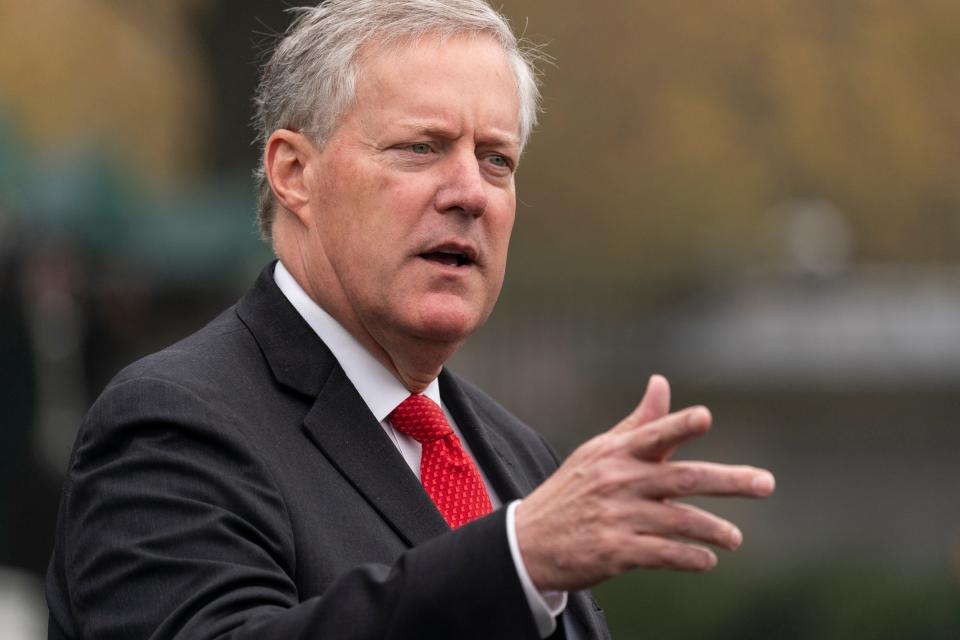Georgia's Fani Willis argues for leaving Mark Meadows' case with Donald Trump in state court
- Oops!Something went wrong.Please try again later.
- Oops!Something went wrong.Please try again later.
- Oops!Something went wrong.Please try again later.
The fight over whether to move the Georgia case against Mark Meadows, the former White House chief of staff, from state to federal court got another go-around as prosecutors argued at a federal appeals court he tried to "meddle in matters of state authority."
Meadows "can point to no law, no constitutional provision, and no lawful duty which authorized him to take the actions he did, and his testimony at the evidentiary hearing in this case underscored the case against his removal rather than for it," prosecutor Donald Wakeford wrote for Fulton County District Attorney Fani Willis in their filing at 11th U.S. Circuit Court of Appeals.
Meadows had asked to move his case to federal court by arguing his federal job should protect him from state level charges. He argued setting up meetings and arranging phone calls for Donald Trump were part of his job. The case is important because at least five of Trump’s 18 co-defendants in the election racketeering case have asked for federal trials. Trump has also said he might make the request.
U.S. District Judge Steve Jones rejected Meadows’ request, ruling that states have a constitutional responsible duty to oversee elections. Meadows appealed to the 11th Circuit.
A three-judge panel considering the case hasn’t decided whether to hear oral arguments and could decide the case based on the written arguments.
Meadows is charged in the overall racketeering conspiracy and with asking Georgia Secretary of State Brad Raffensperger to violate his oath of office. Meadows pleaded not guilty.
Here’s what Meadows and Willis are arguing in the appeal:

What is Meadows arguing in the appeal?
Meadows’ lawyers contend that Jones was wrong on a variety of federal issues. The mistakes included assertions the federal government has no role in the state administration of federal elections, that the executive has no interest in election law and that federal law prohibits a chief of staff from arranging and staffing political meetings for the president.
“These legal pronouncements are completely wrong,” lawyers George Terwilliger, John Moran, Michael Francisco and Francis Aul wrote.
The indictment charged Meadows with racketeering and with asking Georgia Secretary of State Brad Raffensperger to violate his oath of office. Meadows arranged the call Jan. 2, 2021, when Trump asked Raffensperger to “find” him enough votes to win the state.
The indictment also cited a Meadows visit to the Cobb County Civic Center, to observe an audit of ballot signatures. He was denied entry to the non-public audit.
Meadows testified he was concerned about voter fraud. His lawyers argued the visit was part of his official duties.
“This is not a case where the Chief of Staff went down to Georgia in his private capacity and got in some kerfuffle; it is a criminal prosecution of the Chief of Staff based on actions taken in the White House while discharging his official duties,” the lawyers wrote. “He is here solely because he served as Chief of Staff.”
What is Willis arguing in the appeal?
Willis argued that Meadows acknowledged if he was working for Trump's political campaign that he wouldn't be protected from state prosecution.
Raffensperger testified "unequivocally" that there was no federal role for executive branch employees in certification of the state's election.
Despite that, the indictment cited Meadows visiting the Cobb County Civic Center to observe a ballot audit, sent a text to a state official offering campaign funds to hasten the audit and participated in a call Jan. 2, 2021, Trump made to Raffensperger with his campaign's lawyers.
"Time and again, however, Meadows admitted to engaging in acts that under any reasonable analysis constitute campaign activity outside his role as a federal employee, and which establish participation in the criminal" conspiracy, Willis wrote. "As a threshold matter, under questioning, Meadows admitted that then-President Trump had a personal interest in being re-elected and a personal interest in seeing the adverse election results in Georgia, Michigan, and other states overturned."
This article originally appeared on USA TODAY: Georgia DA: federal appeals court should leave Mark Meadows with state

